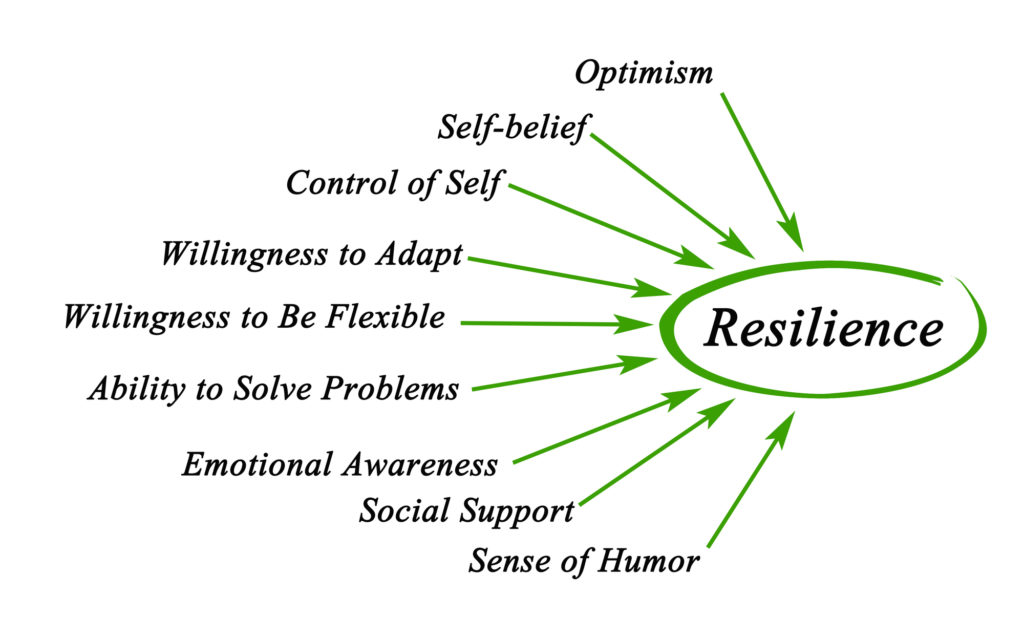
“How can you think yourself a great man, when the first accident that comes along can wipe you out completely.”
— Euripides
Did you know that no matter where you are in your life, you can become more resilient? Resilience is a hot topic and has been for the past few years. Every week more research looks into the topic of resilience. More therapist are realizing the importance of helping client learn to become more resilient.
The subject of resilience in positive psychology deals with the ability to cope with whatever life throws at you. Some people can be knocked down by life and return as a stronger person than ever before. These people are called resilient. Did you know that you can learn how to become more resilient?
A resilient person works through challenges by using personal resources, strengths and other positive capacities of psychological and spiritual capital such as faith, hope, optimism, and self-efficacy. Overcoming a crisis by resiliency is often described as “bouncing back” to a normal state of functioning. Being resilient is also positively associated with happiness.
“If you can’t change it, change the way you think about it.”
We define resilience very merely as a steady trajectory of healthy functioning after a highly adverse event.
Dr. George Everly defines resilience as the ability to withstand, adapt to, or rebound from extreme challenges or adversity.
Dr. George Bonanno defines it this way: By resilience is meant the ability of individuals exposed to a potentially highly disruptive event to maintain both healthy psychological, spiritual and physical functioning and the capacity for positive emotions.
Personal resilience, what we sometimes think of as psychological body armor (a term credited to and copywriter by Dr. George Everly), is your ability to bounce back, to pick yourself up and try again, and again and again until your either succeed or decide on a more productive direction.
Resilience is your ability to see yourself in the dark abyss of failure, humiliation or depression-and bounce back, not only to where you were before, but to even greater heights of success, happiness, intentionality, and inner strength.
Resilience helps you withstand adversity. It gives you a form of immunity that enables you to make the right decisions under pressure, motivates you to move forward and always allows you to bounce back quickly and effectively.
Resilience gives you an edge when things get tough in your relationships.
The great news is that research reveals five factors for personal resilience.
- Active Optimism– It’s the inclination to move forward while others are retreating. But to do so much lead to …
- Decisive Action — You have to make a conscious choice to be decisive and to act to move forward. Clare Boothe Luce stated, “Courage is the ladder on which all other virtues mount.” To grow, you must have the courage to make robust discussions. These decisions are much more comfortable when they are based on a…
- Moral Compass. For me personally, this is based on a biblical world view which is wrapped in honor, integrity, love, and ethical behavior to guide your decisions. Once you have made your decision, you much engage in…
- Relentless Tenacity, and determination. Be persistent, while at the same time knowing when to quit. To find hidden opportunities and aid in physical, psychological, and spiritual energy for the task rely on…
- Active, face to face social support. While social media is important, nothing can replace an appropriate look, word, and touch.
Why is it so important to have an active social support network?
First, it essential to life. Even the Bible talks about the importance of being connected on a personal level. Doing life together is good for your health.
Second, many researchers have discovered that social support if one of the critical components in recovering from Post-Traumatic Stress Disorder.
Third, being connected can have a positive impact on your income.
Fourth, sharing your life with others invites them to share their life with you.
Fifth, having social support makes you stronger both in your personal life and in your relationships.
The ancient wisdom contained in the Book of Ecclesiastes says “A person standing alone can be attacked and defeated, but two can stand back-to-back and conquer. Three are even better, for a triple-braided cord is not easily broken.”
So, how can you begin to be intentionally connected?
All relationships are not equally supportive. Building a network of supportive friends, or even just one supportive relationship can be vital to your wellbeing.
Let me close with one of my favorite pieces of ancient literature. This ancient wisdom helps me in my personal development of resilience;
Proverbs 3:5–6
Trust in the Lord with all your heart;
do not depend on your own understanding.
Seek his will in all you do,
and he will show you which path to take. (New Living Translation)
Please check out these great links:
What Does It Mean to Be Resilient and Why Does It Matter, by my friend Danielle Bernock
Resilience and Tolerances by Seth Godin
Bonanno G. A. Loss, trauma, and human resilience: Have we underestimated the human capacity to thrive after extremely adverse events?. American Psychologist. 2004; 59: 20–28. [PubMed Abstract].[Google Scholar]
Bonanno G. A., Westphal M., Mancini A. D. Resilience to loss and potential trauma. Annual Review of Clinical Psychology. 2011; 7: 511–535. [PubMed Abstract].[Google Scholar]
Everly, George, Strouse, Douglas, McCormack, Dennis. Stronger: Develop the Resilience you need to Succeed, New York. Kindle edition, 2018. pp.265–266
